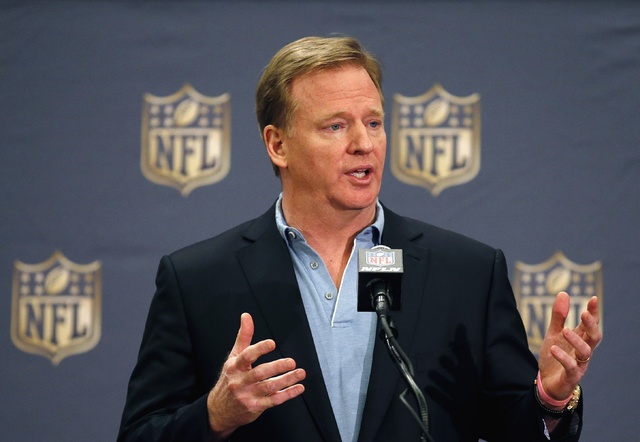PHOENIX — Spice it up. ADVERTISING PHOENIX — Spice it up. The NFL’s dullest play, the extra point, appears to be headed for some changes, perhaps significant ones, for the 2015 season. While team owners didn’t vote on any extra-point
PHOENIX — Spice it up.
The NFL’s dullest play, the extra point, appears to be headed for some changes, perhaps significant ones, for the 2015 season.
While team owners didn’t vote on any extra-point proposals Wednesday, there was so much discussion and interest in potential changes that the issue will be a main focal point for the next set of league meetings in May.
“There’s a clear movement to wanting to change and change it this year,” said Rich McKay, co-chairman of the competition committee and president of the Falcons.
McKay’s committee will “develop alternatives and be ready for a potential vote” in two months in San Francisco.
Among the possibilities are moving the line of scrimmage back for PAT kicks; placing the ball on the 1½-yard line for a 2-point conversion; eliminating the PAT kicks entirely, requiring teams to run a play from scrimmage; and allowing the defense to score, as in college football, if the ball is turned over on a 2-point try.
McKay described the discussions as “lively, with lots of ideas … it’s time to make this a football play.”
“A couple coaches said they favor just lining up on the 2 and going for the 2-point play,” he said. “Or move the ball to the 1 1-2 for two points, or kick from the 15 for one, your choice.”
The league experimented with extra-point kicks from a longer distance last preseason.
Currently, the line of scrimmage for both an extra point and 2-point conversion try is the 2-yard line.
Voted down as the meetings concluded was Chicago’s proposal that each team get a possession in overtime regardless of what happens on the first series.
Now, if the side receiving the OT kickoff scores a touchdown, the game ends. If it kicks a field goal, the opponent gets a possession.
Unsportsmanlike penalties handed out at the end of a half now will carry over, either to the second half or to overtime.
Lining up players with eligible numbers at ineligible positions, as New England did against Baltimore in the playoffs, now has more specific guidelines. Those players must line up inside the tackle box.
The owners also approved teams with retractable domes being allowed to open them at halftime, weather permitting, and allowing linebackers to wear numbers from 40-49; previously they could wear only numbers in the 50s and 90s.
Commissioner Roger Goodell spoke briefly about two high-profile personal conduct cases in which both players, Greg Hardy and Adrian Peterson, remain on the exempt list.
Goodell said the league continues to review Hardy’s case to determine if discipline is warranted. Hardy signed earlier this month with Dallas.
Goodell said the date for Adrian Peterson’s suspension to end remains April 15. The Vikings running back had the ban overturned by appeal, a decision the NFL now is appealing itself.
Also Wednesday:
—The NFL is not focused necessarily on having a team or teams back in Los Angeles in 2016, but it is a hot topic. Goodell noted the league “wants to succeed long term” in LA, so “right now the focus is on the process and also understanding what it takes to be successful in the LA market.”
A report on all three teams interested in moving there — the Rams, Chargers and Raiders — is expected in late April, and Goodell said the owners then would discuss it in San Francisco.
• Expansion of the playoffs by two teams was discussed, but won’t be happening for a while. Goodell mentioned scheduling issues as well as competitive questions for such delays.
• Ted Wells’ investigation into the deflated footballs in the AFC championship game is ongoing, with no timetable on its conclusion.
• Texting during a game by Browns general manager Ray Farmer is still being investigated to see if any league rules were broken.
Earlier in the week, of the 13 video replay alterations proposed, including extending the number of coaches’ challenges and letting them challenge all officiating calls, the only one passed will allow game officials to use replay for clock issues at the end of a half, game or overtime if more than 1 second remains.
Five player safety rule changes were made, the most notable allowing a medical adviser to stop a game if he believes a player is disoriented, having the player removed from the field and examined on the sideline or in the locker room.



